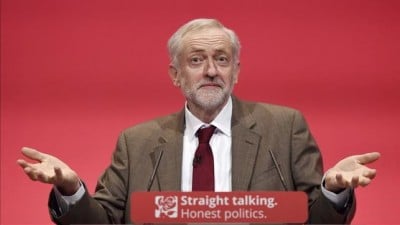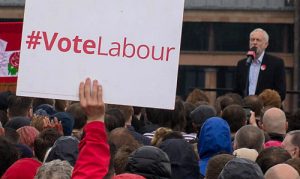Saint Corbyn? Words Versus Deeds
A Response to My Detractors

Illusion and Reality
It’s interesting reading comments on the essays I write that get published around the world on various websites (at least those that permit comments) regarding Jeremy Corbyn.
What appears to generate the most ire are my views on Jeremy Corbyn and the Labour Party as the alleged vehicle for radical, social transformation. It seems the man can do no wrong. He appears to have achieved some kind of saintly status amongst those on the left and amongst progressives in general, let alone the millions who voted for him. So is it any wonder that my decidedly unfashionable views provoke such negative reactions?
I suppose it’s also understandable given as how such ‘sanctified’ individuals are so rare amongst the professional political class, that actually having one who who appears to have principles is a wonder to behold. It would seem that the adage, ‘beggars can’t be choosers’, best describes the opinions of progressives on Corbyn.
However, I live in the real world, not one of make believe or wishful thinking and notwithstanding Corbyn’s long held progressive views (40 years or so) in the Labour Party as a back bencher[1] in successive Labour governments, firstly, what have been his actual achievements over four decades and what are his chances of bringing about actual, real progressive change utilising a Labour government as the vehicle?
Notwithstanding the successes of the 1945 postwar Keynesian Labour government, the National Health Service and so on, successive Labour governments have been for the most part examples of the vilest kind of backstabbing of its supporters and especially of its alleged allies on the left and of the working class in general, never mind its gung ho imperialism and neo-colonialism!
Indeed, one can argue that successive Labour governments opened the door for successive Tory governments’ attacks on the gains made by that 1945 Labour victory, culminating in the Blair victory in 1997. Policies that without Labour governments persuading its voters that ‘there was no alternative’, Tory governments would have had a great deal more difficulty in enacting their policies, proving that the Labour Party is no more than the ‘liberal wing’ of a de facto one-party state.
Thus the privatisation (rollback) that began under the Thatcher government of 1979 was made possible by the capitulation of prior Labour governments and their attacks on the organised working class and its structures, culminating in the complete adoption of so-called neoliberalsm by ‘New Labour’ in 1997.
So what’s going on here? How can we explain firstly, the survival of Corbyn for all these decades whilst all around reaction triumphed? How is it that a handful of leftish Labour MPs survived in a swamp of rightwing, pro-capitalist Labour MPs and for that matter, governments, when by rights they should been shown the door decades ago?
Could it be that they survived in name only, sitting comfortably on their backsides, sorry benches, making all the ‘right’ noises, turning up at all the ‘right’ demonstrations and protests, in order to justify their longtime survival as tokens of the Labour ‘left’? Not that this was a conscious process, just the inevitable outcome of generations of attempts at ‘reforming’ capitalism.
Secondly, and in a way even more importantly, doesn’t/didn’t their survival help create/maintain the illusion of political diversity in the otherwise politically monochrome world of the two-party system?
I suppose that at this point the supporters of Saint Corbyn can accuse me of cynical backstabbing, that in not giving my wholehearted support to what little power we have, I’m opening the door for the right.
Well all I can say is that credits me with a whole lot of power I don’t possess, I just try to assess the situation in the real world, not the one invented by wishful thinking and I think events over the past two years, since the rise of Corbyn bear me out.
Words Versus Deeds
We need only compare his draft Election Manifesto with the one finally adopted to see where Corbyn actually stands.
Firstly, his capitulation to the imperialists in the leadership of the Labour Party over NATO, nuclear weapons and the right to wage war on the planet in the name of democracy and ‘humanitarian intervention’.
[T]he concessions contained in Labour’s draft manifesto have since been revealed as only a staging post for Corbyn in what his shadow foreign secretary, Emily Thornberry, described as a “journey” towards accepting NATO and nuclear war.
The qualification on the use of the armed forces contained in the draft version, “That’s why we will never send them into harm’s way unless all other options have been exhausted,” is removed in the final manifesto. – ‘Labour’s manifesto amended to stress commitment to militarism and war‘ By Robert Stevens, WSWS, 19 May 2017.
Secondly, his capitulation over the Tory Austerity programme, led by his ‘ally’ Emily Thornberry (with friends like this, who needs enemies?), and currently touted as the ‘replacement’ for Corbyn in some future coup by the Right in the Labour Party.
The draft, produced by the team around Labour’s nominally left leader Jeremy Corbyn, was subject to ratification by the party’s top officials on May 11. It sought to marry a watery commitment to certain social reforms and a slight relaxation in the Conservatives’ austerity agenda with a raft of measures demanded by the Blairite right wing. (ibid]
So on two, fundamental issues of principle, about which so much hot air has been exhaled, before the war had even begun, the outcome had already been decided!
The means justifying the end or the end justifying the means?
Okay, let’s give Corbyn and his Labour Party supporters the benefit of the doubt and assume that his capitulation was no more than a ‘tactical retreat’, that once ‘in power’ he would reverse his position and for example, appeal to his voters to support him and overrule his majority rightwing Labour MPs over these critical issues of principle let alone tactics (lose the battle but win the war).
Remember he is/would be heading up a Labour government more than 90% virulently opposed to Corbyn ad his policies, never mind the entrenched state machine, the Civil Service, the corporate/state media, the military and security state, big business and of course NATO and the US, that ugly big bear in the living room.
But can we see Corbyn calling on hs supporters (I calculate maybe one third of the electorate) to take to the streets and back him should the Establishment move against him (as it most surely would)? This in the light of the fact that not a single thing has been done in the way of organising and preparing for extra-Parliamentary actions, beyond the odd demonstration over single issues eg, the NHS, and possibly the only issue that commands the support of the vast majority. Even here, the upcoming February 3, 2018 demonstration is no more than a flash in the pan. Compare our campaigns to the ones taking place in France over comparable attacks on the working class for example and you get an idea of just how pathetic left opposition is here and what a failure the Labour Party has been in this regard.
Add to that, the one concession to fighting a 21st century fight, Momentum (initiated, not by the Labour Party, well not actually, but by ‘entryists’ from the Socialist Workers Party), once the Labour bureaucracy saw the writing on the wall, they took it ‘in-house’. Goodbye Momentum, been nice knowing you! But actually, it just shows what can be done, once you step outside the Labour Party straightjacket! More’s the pity, those damn opportunists from the SWP chose to use the Labour Party as their vehicle (yet again)! Just remember folks, there is history behind all this. Momentum didn’t just appear overnight like mushrooms after the rain.
And the reasons for this contrast are quite clear; Corbyn has never developed a programme that excludes the Labour Party as the central, driving force for radical, social transformation (never mind that word, socialism) and replace it with grassroots activism and organisation. How can he, when he still sees the Labour Party as the exclusive vehicle for radical social change and Parliament as the road down which it would travel?
As I’ve said several times before, in fact I’m sick of repeating myself, Corbyn is joined at the hip to the Labour Party. As the pundits are always saying, the Labour Party is in his DNA. Ultimately therefore, Corbyn’s first allegiance is to the Labour Party and it informs and determines his every move.
And it’s this, more than anything else that has and is, determining the left’s divided loyalties over Corbyn, for as long as they see a ‘reformed’ Labour Party as the only vehicle for social transformation, not only will we fail in that objective, an entire generation of repoliticised people will be, once more, disabused of political change and the power of collective action by the failure of a Labour government to honour its commitments. They will, once more, retreat into individualised activities aka ‘charities’, single issue campaigns and such like. History shows that only collective actions achieve results, and in the year that (mistakenly[2]) celebrates the centenary of womens’ right to vote (they only got the full vote ten years later, in 1928), it behoves me to remind you of that fact.
*
This article was originally published by Investigating Imperialism.
Notes
1. Back bencher is another way of saying that he played no part in formulating the Labour government’s policies over those 40 years. Sidelined would be a better description, held in reserve, should a ‘left’ voice be needed.
2. As a result of campaigns dating back to the mid-nineteenth century, some women were finally granted the vote in 1918. However, many women were still excluded from the franchise – the Representation of the People Act enfranchised all males and women over the age of 30 who already had the right to vote in local elections. 8,400,000 women were enfranchised. Universal franchise was finally granted with the Equal Franchise Act of 1928. – ‘The campaign for suffrage – a historical background‘, British Library.


